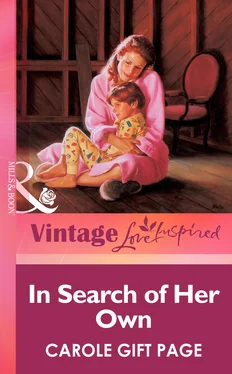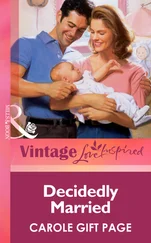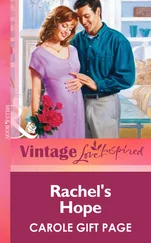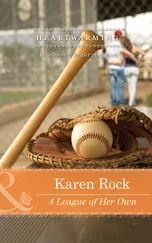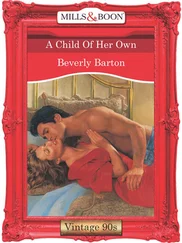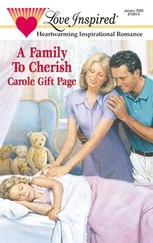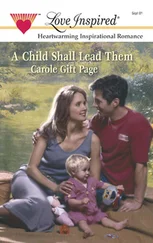He squeezed her hand tightly as she slipped into the driver’s seat. “Call me when you get there.”
“It’ll be late,” she warned.
“That’s all right I’m a night owl at heart.”
As she waved a last goodbye and pulled out of the driveway, she felt a disconcerting reluctance to go. She dreaded the long drive down the coast alone, but even more so she hated leaving Phillip.
“I can’t let myself feel this way,” she chided herself as she turned onto the freeway heading south. “My involvement with Phillip was supposed to remain strictly professional. All right, who am I kidding? We’ve become friends, but that’s all it’s going to be. Neither Phillip nor I are ready for an emotional entanglement. It’s the last thing either of us wants.”
She sounded so certain, so positive. Why then wasn’t her heart listening?
The drive down the coast was longer than Victoria remembered. It had seemed so short last Saturday riding with Phillip. They had been so engrossed in conversation that the miles had flown by. Now the miles dragged with a dull, grudging sameness.
The closer Victoria got to Middleton, the more her son weighed on her mind. Would she be able to solve the mystery of Joshua? Would she find him? And what would she find? Dear God, please let me find my boy, and please let him be all right Let him be alive! Give me a chance to see him, and know him, and love him!
When at last Victoria pulled into the Hewlett driveway on Blackberry Street, her head throbbed and her back ached. Was it the long drive or the anticipation of her stay with the Hewletts? In the heavy, fog-shrouded darkness, the rambling old house looked more ominous than ever. Victoria shuddered. If Phillip were with me, I wouldn’t be afraid, she thought, and immediately cast the idea aside. Forget Phillip, she scolded silently.
As she climbed out of the car, she arched her shoulders, then strode purposefully up the walk to the porch. Lights were on inside, so someone was home. She knocked soundly, her heart pounding. It was ridiculous to feel so nervous. There was nothing to fear. She had come to find the answers about her son Nothing else mattered now.
After a minute the door opened and a tall, angular man in glasses and a striped work shirt stared down at her. He was bald except for a patch of gray-black hair on each side of his head His long, thin, hangdog face merged unceremoniously with his neck. “Miss Clarkin?” he muttered.
“Carlin,” she corrected.
“In your letter you said you was arriving today. I didn’t expect you meant after dark.”
“It was a longer drive than I remembered.” She looked past him into the living room. “May I come in?”
He stepped back slowly and nodded, but his small, dark eyes remained fastened on her through his thick lenses. “Make yourself at home.” His voice was monotone.
“You must be—” she began.
“Sam Hewlett.” He looked over at the heavyset woman in the kitchen doorway. “You already met Maude.”
Victoria nodded and forced a smile. “It’s good to see you again, Mrs. Hewlett”
“You missed dinner,” snapped the woman. “It’s at six sharp. I can’t keep things sitting, getting cold.”
“I picked up a bite on my way,” Victoria told her. “I’m really very tired. I’d just like to bring my things in and go to my room.”
Maude’s expression softened. “It’s too late for dinner, but I got some herb tea brewing. It’s called Almond Pleasure. Smells real good, don’t it?”
Victoria smiled relentingly. “It smells wonderful.”
Maude gestured to Sam. “You go help her bring in her stuff. I’ll pour the tea and set out some glazed doughnuts.”
With Sam’s help, Victoria quickly transferred her belongings from her compact car to the old-fashioned bedroom that would be hers. Now, sitting across from the Hewletts in their cozy, Early American kitchen, Victoria wondered why she had felt so nervous. Although the Hewletts were rather gruff, unschooled people, they seemed like decent, unpretentious folk. Perhaps it had been nothing more than Victoria’s overactive imagination that had aroused her suspicions about them in the first place.
“You want another doughnut, Miss Carlin?” asked Maude.
“No, thank you,” said Victoria. “But I will have more tea. It’s delicious.”
“It’s just tea bags I get at the grocery. They got all kinds of fancy stuff these days.”
Sam sat back and rubbed his large hand over the fine network of bluish veins in his forehead. The pouches under his eyes puffed slightly as he worked his mouth into a curious grin. “You an authoress, Miss Clarkin? The wife says you came here to write a book or something.”
“Not exactly a book,” said Victoria. “I’m a university instructor in American literature I’m working on my doctoral thesis.”
“That sounds pretty highfalutin to me,” he replied. “What you writing about?”
Victoria hesitated. Should she tell him or get by with an evasive answer? “I’m doing a comparison study,” she said.
“Whatcha comparing?”
“The lives and works of Flannery O’Connor and Sylvia Plath “
“Never heard of them,” he scoffed.
“They were American writers who died in the early sixties,” she explained patiently
“So why bother about them?”
She felt as if she were back in her lecture hall at the university. “They both wrote intensely and perceptively about the dark side of human emotion.”
“The dark side?” Maude echoed suspiciously. “Sounds like devil talk to me.”
Victoria shrugged. “I suppose you could put it that way Both women explored the dark, disturbed or evil side of human nature. I want to demonstrate how their God-consciousness, or, in one case, lack of it, influenced their lives and work.”
“God-consciousness?” Sam grunted, as if she had said something stupid.
“Yes,” replied Victoria, wishing she hadn’t pursued this very personal subject of her thesis with the Hewletts. Her thoughts and ideas were still in an embryonic stage, fragile, vulnerable. She didn’t want to damage them by exposing them to the Hewletts’ scorn or contempt. Still, she had begun this conversation; she might as well finish it. “O’Connor embraced God heartily,” she explained, “and her faith shows in her work just as it showed in her life. In spite of a long, debilitating illness, O’Connor managed to achieve a fulfilled, abundant life.”
“So?” snapped Maude. “What was she? Some saint? We all got our crosses to bear, you know “
Victoria cleared her throat imtably and pressed on. “Plath, on the other hand, desperately longed to believe in God, but ultimately she rejected Him In spite of career success, marriage to a famous poet and two healthy children, Plath succumbed to despair and committed suicide when she was thirty.”
“That don’t mean nothing,” said Sam. “Lots of people do that. What’s your point?”
“My point is,” persisted Victona, quelling her exasperation, “a person’s God-consciousness affects and, in fact, determines his or her earthly and eternal destiny.” She considered adding a word about Christ and redemption, but witnessing about her faith was still a new and terrifying prospect for Victoria. She had already said more than she intended. She didn’t want to come across as a pious prude or a bookish, intellectual boor
“It’s all a lot of hogwash, if you ask me “ Maude snorted. “The way I see it, the devil’s the one you gotta watch out for. I learned that at my mama’s knee “
Victoria managed a smile. She carefully pushed back her chair and said, “I’m really tired. I think I’d better get to bed.”
Maude stood, too. “Suit yourself, Miss Carlin I’ll show you the way “ She led Victoria down the hall to her room and opened the door. “Everything’s ready. There’s extra bedding in the closet. Sam plugged in an extension phone for you. Of course, you pay for any long-distance calls you make.” She looked around as if trying to recall something else, then added, “The bathroom next door is yours. You get fresh towels and sheets twice a week.”
Читать дальше
